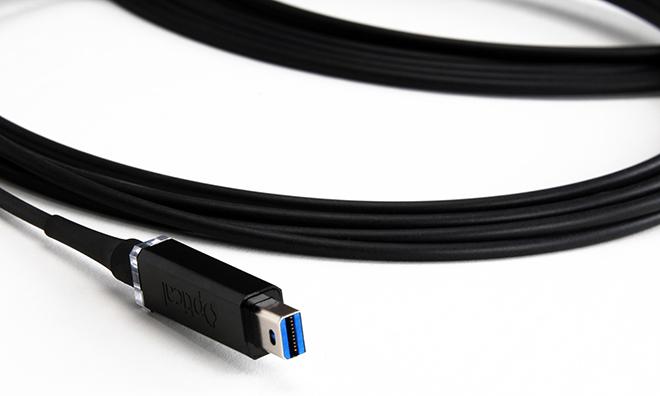At the Intel Developer Forum on Wednesday, Corning announced that its Thunderbolt Optical Cables are the first completely optical fiber products to receive Intel's certification.
The news comes more than half a year after Corning first debuted the "Thunderbolt Optical Cables" at CES 2013 in January alongside a USB standard solution dubbed "USB 3.Optical Cables."
Corning's all-optical Thunderbolt cables use the company's ClearCurve VSDN optical fiber technology to deliver high data speeds over longer distances than traditional copper cables. The optical fiber versions are also 50 percent smaller and 80 percent lighter than their copper counterparts.
“Based on Intel’s Thunderbolt protocol, Corning is providing a fast, innovative cabling solution designed for data-intensive connectivity,†said Bernhard Deutsch, vice president of Product Line Management, Optical Connectivity Solutions at Corning. “Thunderbolt Optical Cables by Corning empower users to quickly access and move data between devices at distances copper cables cannot.â€
Corning plans to make the cables available at various lengths starting at 10 meters, though final product specifications have yet to be revealed.
A release date has yet to be nailed down for the Thunderbolt Optical Cables, though Corning sees the product rolling out to distributors, resellers and online shops in the "coming months." Those interested can keep track of retail status through the company's website.
 AppleInsider Staff
AppleInsider Staff








 Charles Martin
Charles Martin

 Malcolm Owen
Malcolm Owen
 William Gallagher
William Gallagher

 Christine McKee
Christine McKee
 Wesley Hilliard
Wesley Hilliard









22 Comments
Can anyone tell me how flexible/robust optical fiber is compared to CAT-5, USB or HDMI? I've only ever dealt with copper cables in my travels. From the looks of the picture, it appears it's able to bend pretty decently. How well does it deal with kinks?
Normal fiber optics are not robust at all to bending. The "usual" Corning SMF-28e is specified for a max bend diameter of 32 mm. ClearCurve is a special fiber designed to be able to be tolerant of bends, it's specified to a bend radius of 1.5 mm.
Fiber is usually very tolerant to pulling and smashing, unless you get to the connectors.
Sounds expensive. Very expensive.
Sounds like every single new technology ever made, then.
Normal fiber optics are not robust at all to bending. The "usual" Corning SMF-28e is specified for a max bend diameter of 32 mm. ClearCurve is a special fiber designed to be able to be tolerant of bends, it's specified to a bend radius of 1.5 mm.
Fiber is usually very tolerant to pulling and smashing, unless you get to the connectors.
Thanks for the info - I appreciate it! :)